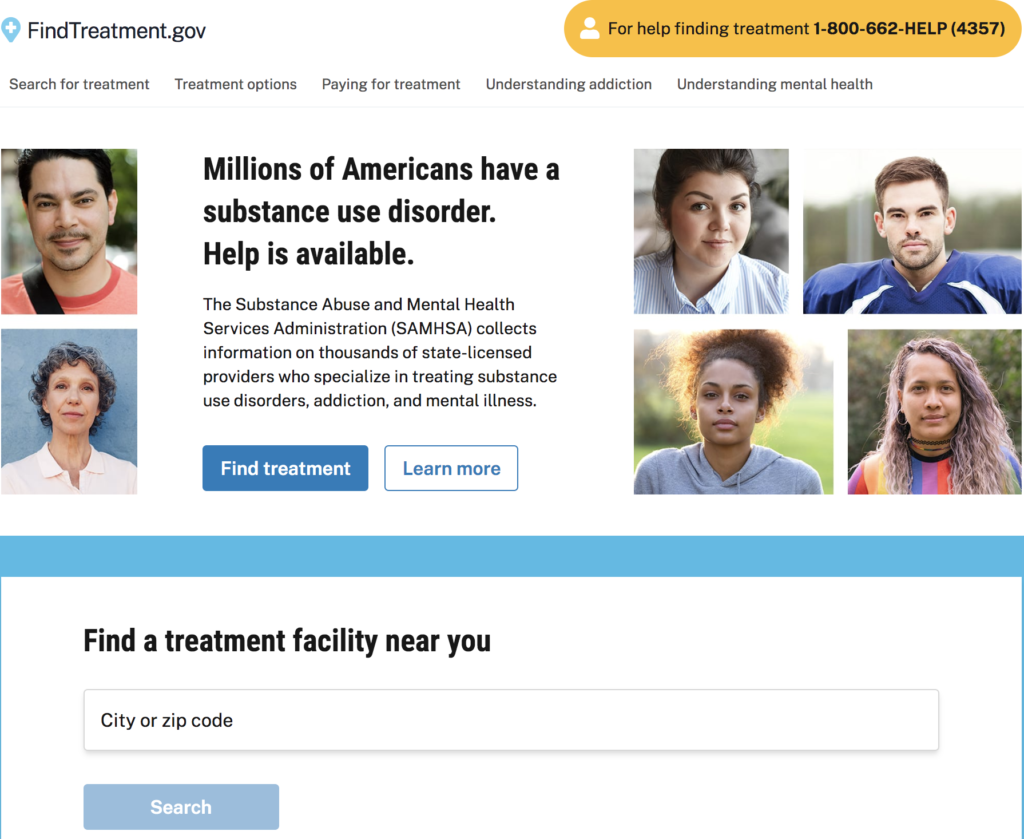A comprehensive resource (“one-stop shopping”) for finding substance use treatment facilities is findtreatment.gov, which is a website maintained by the Substance Abuse and Mental Health Services Administration (SAMHSA).
Findtreatment.gov can help patients, family members, and clinicians find treatment facilities for substance use disorders based on the location (city or zip code) and the distance or radius within which the patient can travel.
The search can then be narrowed, if needed, based on options within the following major categories:
Treatment type
Payment options
Age
Other languages spoken
Special programs
Medication-assisted treatment (MAT)
Let’s do an example
In November 2019, I did a trial search based on the zip code of one of my offices. Leaving the distance at the default value of 25 miles, I found 185 substance use treatment facilities. So, I tried a few ways of narrowing the search.
Detox facilities only — 37 facilities found
Detox facilities that provide “Free or no-cost care” — no facilities found
Detox facilities that accept Medicaid — 31 facilities found
Detox facilities that accept Medicaid and treat Youth (under 18) — 4 facilities found
Then, I searched for Outpatient programs for Adults that provide Methadone treatment — 3 facilities found
Yeah, the page seems to work well.
The rest of this page is not essential for you to read. It lists the options under each of categories that can be used to narrow the search. If you want, you can just quickly glance at these, simply to get a general idea of what kinds of criteria can be put in to narrow the search. These options are listed, of course, on findtreatment.gov.
When you try out findtreatment.gov to help one of your patients find appropriate substance use disorder treatment, please do let me know at mago@simpleandpractical.com whether or not this resource was helpful.
Narrowing the search: By Treatment type
Here are the options in the sidebar to chose from:
All types of treatment
Interim care When immediate admission to other care isn’t available)
Detox (Supervised withdrawal from substance use)
Outpatient (Treatment at a program site while a patient lives on their own)
Hospital inpatient (24/7 care connected to a hospital, lasting days or weeks)
Residential (Live-in care, lasting for one month to one year)
Transitional housing (Temporary space to stay while transitioning from an intensive treatment setting. Sometimes called a halfway house or sober living)
Co-occurring mental health and substance use treatment (Integrated care that addresses substance use and mental illness)
Telemedicine (including internet and mobile programs. Care given over the phone or online to support treatment and recovery)
Narrowing the search: By Payment options
All payment options
Private health insurance (Those with private insurance typically get it through an employer or insurance exchange. For example: PPO or HMO coverage)
Medicaid (Government program providing health coverage for people with very low income)
Free or no-cost care (Free services; no payment needed)
Medicare (Federal health insurance for adults 65 and older, or younger people with certain disabilities)
Payment assistance available (Facilities that may offer help paying for services. Check with the facility for details)
Sliding fee scale (Adjustable fees based on income)
Cash or self-payment (Accepts direct payment for treatment)
Military insurance (e.g. TRICARE)
IHS/Tribal/Urban (ITU) funds
Narrowing the search: By Age
All ages
Adults (18 and older)
Youth (under 18)
Narrowing the search: By Special programs
Veterans
LGBT (Lesbian, gay, bisexual, transgender)
Services for the deaf and hard of hearing
Narrowing the search: Medication-Assisted Treatment (MAT)
Show all facilities (Includes facilities that do not offer medication-assisted treatment)
Methadone (Controls withdrawl symptoms and blocks cravings. Given in person at a clinic, usually every day)
Buprenorphine (Works similar to methadone, and can be prescribed to take at home)
Naltrexone (Blocks the effects of opioids and alcohol completely)
Related Pages
How to find different types of treatments (therapists, TMS, inpatient treatment facilities)
How to find a Cognitive-Behavior Therapist
How to find a Dialectical-Behavior Therapist
How to find a OCD therapist/support group
How to find a facility providing Transcranial Magnetic Stimulation (TMS)
Private psychiatric hospitals
How to choose a rehab
Private facilities for treatment of substance use disorders
Copyright © 2019 to 2025, Simple and Practical Medical Education, LLC. All rights reserved. The content on this website may not be reproduced in any form without express written permission.
Disclaimer: The content on this website is provided as general education for medical professionals. It is not intended or recommended for patients or other laypersons or as a substitute for medical advice, diagnosis, or treatment. Patients must always consult a qualified health care professional regarding their diagnosis and treatment. Healthcare professionals should always check this website for the most recently updated information.

Leave a Reply